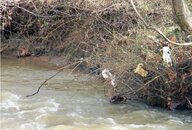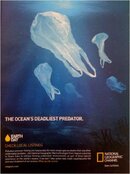Tonight, on the TV show Nightline, Dr. Sylvia Earle was being interviewed by ABC correspondent Bob Weir from the Aquarius habitat off Key Largo, FL. The interview focused on the fact that government cutbacks might close the Aquarius reef base and about her concerns regarding the future sustainability of our oceans.
Every decade of our sport has been defined by its fad. In the 1950's it was spearfishing. In the 1960's it was treasure diving. In the 1970's it was exploration and living in the sea. The 1980's brought us travel and resort diving. The 1990's saw the birth of technical diving. The first decade of the new millennium has been the advancement of rebreather technology. What's next?
What's next is going to up to you new divers and those thinking about diving. As I write this I'm 44 years old. When I started snorkeling as a child in the mid 1970's Jacques Cousteau was my hero. In his television show, The Undersea World of Jacques Cousteau, he warned us about climate change and stressed seas and the importance of conservation for our planet. Nearly 40 years later and some people are in still in denial that Earth is struggling against negative human impact.
Saving our planet, I'm afraid, will need to become your mission. But, while this task may end up falling upon you, your rewards will probably be greater than any of us have ever known.
Most of us have lost the plot. Today's diver is focused upon himself rather than his environment. Arguments about training, skills, and gear configurations have taken up way too much time and effort in social media and placed way too much emphasis on what's important. Today's diver has turned the sport primarily into a competition - diving and exploration seem ego-driven. Today's instructors are competing with one another by turning students into swimming billboards of prowess and perfection. While all of this has probably made diving safer and changed the face of the sport, I think that this wave is closing out.
Become skilled, knowledgeable, and good divers, but forget about the quest for perfection. Don't let perfection become the enemy of the good. Turn the focus of diving away from the diver and back into what is to be dived.
I hope that the next decades of diving find divers with a new interest in the beauty and importance of the environment like never before. I hope that you will abandon chasing C-cards and seek more experiences and put away agency politics and philosophic arguments and join together to bring about a new "Age of Aquarius" in which the underwater realm is enjoyed, loved, discovered and protected. I don't have the answers to how you can save the planet, but I'm sure as you discover the answers the rewards will be tremendous.
No matter what you do for a living, how often you dive, or what your diving interests will be, I hope each of you will use your vocational connections and your avocational passions toward saving our aquatic and ocean realms. Welcome to diving. We need you.
Every decade of our sport has been defined by its fad. In the 1950's it was spearfishing. In the 1960's it was treasure diving. In the 1970's it was exploration and living in the sea. The 1980's brought us travel and resort diving. The 1990's saw the birth of technical diving. The first decade of the new millennium has been the advancement of rebreather technology. What's next?
What's next is going to up to you new divers and those thinking about diving. As I write this I'm 44 years old. When I started snorkeling as a child in the mid 1970's Jacques Cousteau was my hero. In his television show, The Undersea World of Jacques Cousteau, he warned us about climate change and stressed seas and the importance of conservation for our planet. Nearly 40 years later and some people are in still in denial that Earth is struggling against negative human impact.
Saving our planet, I'm afraid, will need to become your mission. But, while this task may end up falling upon you, your rewards will probably be greater than any of us have ever known.
Most of us have lost the plot. Today's diver is focused upon himself rather than his environment. Arguments about training, skills, and gear configurations have taken up way too much time and effort in social media and placed way too much emphasis on what's important. Today's diver has turned the sport primarily into a competition - diving and exploration seem ego-driven. Today's instructors are competing with one another by turning students into swimming billboards of prowess and perfection. While all of this has probably made diving safer and changed the face of the sport, I think that this wave is closing out.
Become skilled, knowledgeable, and good divers, but forget about the quest for perfection. Don't let perfection become the enemy of the good. Turn the focus of diving away from the diver and back into what is to be dived.
I hope that the next decades of diving find divers with a new interest in the beauty and importance of the environment like never before. I hope that you will abandon chasing C-cards and seek more experiences and put away agency politics and philosophic arguments and join together to bring about a new "Age of Aquarius" in which the underwater realm is enjoyed, loved, discovered and protected. I don't have the answers to how you can save the planet, but I'm sure as you discover the answers the rewards will be tremendous.
No matter what you do for a living, how often you dive, or what your diving interests will be, I hope each of you will use your vocational connections and your avocational passions toward saving our aquatic and ocean realms. Welcome to diving. We need you.
Last edited:






